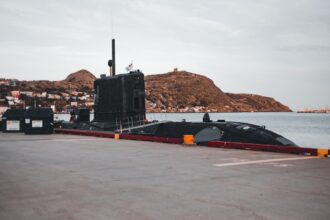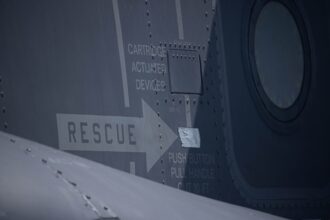The Russian Spetsnaz, a term that translates to “special purpose forces,” represents an elite group within the Russian military and security apparatus. These units are renowned for their rigorous training, specialized skills, and ability to conduct a wide range of operations, from counter-terrorism to reconnaissance missions. Spetsnaz operatives are often characterized by their versatility, adaptability, and proficiency in various combat techniques, making them a formidable force in both conventional and unconventional warfare.
Their reputation is not merely built on their operational capabilities but also on the mystique surrounding their clandestine missions and the secrecy that often shrouds their activities. The significance of Spetsnaz extends beyond mere military prowess; they embody a critical component of Russia’s national security strategy. As geopolitical tensions rise and the nature of warfare evolves, the role of these special forces becomes increasingly vital.
Their ability to operate in diverse environments, often behind enemy lines, allows them to gather intelligence, disrupt enemy operations, and execute high-stakes missions that can alter the course of conflicts. Understanding the intricacies of Spetsnaz is essential for comprehending modern military strategies and the evolving landscape of global security.
Key Takeaways
- Russian Spetsnaz is a special forces unit known for its elite training and covert operations.
- Spetsnaz has a long history of evolution, starting from World War II to the present day, adapting to modern warfare tactics.
- The selection process for Spetsnaz is rigorous, with intense physical and mental training to create highly skilled operatives.
- Spetsnaz technical cells are responsible for specialized missions such as sabotage, intelligence gathering, and unconventional warfare.
- Spetsnaz operatives are equipped with advanced gear and weapons, including specialized equipment for covert operations.
History and Evolution of Spetsnaz
The origins of Spetsnaz can be traced back to the Soviet Union during World War II, where specialized units were formed to conduct sabotage and reconnaissance missions against Nazi forces. These early iterations laid the groundwork for what would eventually evolve into a more structured and formalized branch of military operations. The term “Spetsnaz” itself gained prominence in the 1950s when the Soviet military began to establish dedicated special forces units designed to respond to a variety of threats, including guerrilla warfare and counter-insurgency operations.
Throughout the Cold War, Spetsnaz underwent significant evolution, adapting to the changing dynamics of warfare and international relations. The Soviet Union’s involvement in conflicts such as the Afghan War in the 1980s showcased the effectiveness of these elite units in unconventional warfare scenarios. Their ability to conduct covert operations, gather intelligence, and engage in direct action missions solidified their reputation as a critical asset within the Soviet military framework.
As the geopolitical landscape shifted with the dissolution of the Soviet Union, Spetsnaz continued to adapt, reflecting the new realities of post-Cold War conflicts.
Training and Selection Process
The selection process for Spetsnaz is notoriously rigorous, designed to identify individuals who possess not only physical strength but also mental resilience and tactical acumen. Candidates undergo a grueling series of tests that assess their endurance, combat skills, and psychological fortitude. This demanding selection process ensures that only the most capable individuals are chosen to join the ranks of these elite forces.
The training regimen is comprehensive, encompassing a wide array of disciplines, including hand-to-hand combat, marksmanship, survival skills, and advanced tactics. Once selected, recruits enter an intensive training program that lasts several months, during which they are subjected to extreme physical challenges and simulated combat scenarios. This training is not merely about physical conditioning; it also emphasizes teamwork, leadership, and decision-making under pressure.
The psychological aspect of training is equally important, as operatives must learn to remain calm and focused in high-stress situations. The culmination of this rigorous training process produces highly skilled operatives capable of executing complex missions with precision and efficiency.
Role and Missions of Spetsnaz Technical Cells
| Role and Missions of Spetsnaz Technical Cells |
|---|
| 1. Conducting reconnaissance and surveillance operations |
| 2. Sabotage and demolition of enemy infrastructure |
| 3. Conducting raids and ambushes |
| 4. Providing technical support for Spetsnaz operations |
| 5. Conducting electronic warfare and cyber operations |
Spetsnaz technical cells play a crucial role within the broader framework of Russian special operations. These specialized units are tasked with a variety of missions that require advanced technical skills and expertise in areas such as cyber warfare, electronic surveillance, and intelligence analysis. Their operations often involve gathering critical information about enemy capabilities and intentions, which can significantly influence strategic decision-making at higher command levels.
The versatility of Spetsnaz technical cells allows them to operate across multiple domains, including land, air, and cyber environments. They are often deployed in conjunction with other military units to enhance operational effectiveness. For instance, during joint exercises or real-world missions, these technical cells provide essential support by leveraging their advanced technological capabilities to gather intelligence or disrupt enemy communications.
This integration of technical expertise with traditional military tactics exemplifies the modern approach to warfare that emphasizes adaptability and innovation.
Equipment and Gear Used by Spetsnaz
The equipment utilized by Spetsnaz operatives is specifically designed to enhance their operational effectiveness while ensuring their safety in high-risk environments. From advanced weaponry to specialized gear, every piece of equipment is carefully selected to meet the unique demands of their missions. Firearms such as the AK-74M assault rifle and various sniper rifles are standard issue, providing operatives with reliable firepower in combat situations.
In addition to firearms, Spetsnaz operatives are equipped with cutting-edge technology that aids in surveillance and communication. Night vision goggles, tactical drones, and encrypted communication devices are integral components of their gear, allowing them to operate effectively in diverse environments and conditions. Furthermore, their clothing is designed for functionality and stealth; lightweight materials that offer durability while minimizing noise are preferred.
This combination of advanced weaponry and specialized gear ensures that Spetsnaz operatives can execute their missions with precision and efficiency.
Specialized Skills and Techniques
The training regimen for Spetsnaz operatives encompasses a wide range of specialized skills that are essential for success in various operational contexts. Hand-to-hand combat techniques are a fundamental aspect of their training, enabling operatives to engage effectively in close-quarters situations where firearms may not be practical. Mastery of martial arts disciplines such as Sambo and Systema equips them with the ability to neutralize threats swiftly and efficiently.
In addition to physical combat skills, Spetsnaz operatives receive extensive training in tactics related to reconnaissance and infiltration. They learn how to navigate challenging terrains undetected while employing stealth techniques that minimize their visibility to adversaries. This expertise is complemented by advanced marksmanship training that ensures they can engage targets accurately under pressure.
The combination of these specialized skills allows Spetsnaz operatives to adapt to various mission requirements while maintaining a high level of operational effectiveness.
Covert Operations and Intelligence Gathering
Covert operations form a cornerstone of Spetsnaz activities, reflecting their role as elite operatives capable of executing high-stakes missions with minimal oversight. These operations often involve infiltrating enemy territory to gather intelligence or disrupt critical infrastructure without detection. The ability to operate covertly is paramount; thus, operatives are trained extensively in surveillance techniques, evasion tactics, and information extraction methods.
Intelligence gathering is not limited to physical infiltration; it also encompasses cyber capabilities that have become increasingly vital in modern warfare. Spetsnaz technical cells leverage advanced technology to intercept communications, gather data from electronic devices, and analyze information that can provide insights into enemy plans and capabilities. This multifaceted approach to intelligence gathering enhances situational awareness for Russian military leadership and informs strategic decision-making processes.
Coordination with Other Military and Intelligence Agencies
The effectiveness of Spetsnaz operations is often amplified through coordination with other military branches and intelligence agencies within Russia’s security apparatus. This collaboration ensures that special forces can leverage resources and expertise from various sectors while executing complex missions. Joint exercises between Spetsnaz units and conventional military forces foster interoperability and enhance overall operational effectiveness.
Moreover, coordination extends beyond national borders; Spetsnaz has been known to collaborate with allied nations on specific missions or training exercises aimed at counter-terrorism or regional stability. This collaborative approach not only strengthens international partnerships but also enhances the capabilities of Spetsnaz by exposing them to diverse operational environments and tactics employed by other nations’ special forces.
Notable Operations and Achievements
Throughout their history, Spetsnaz has been involved in numerous high-profile operations that have showcased their capabilities on both national and international stages. One notable operation was during the Second Chechen War when Spetsnaz units conducted targeted strikes against insurgent leaders and infrastructure, significantly impacting the course of the conflict. Their ability to execute precise operations with minimal collateral damage earned them recognition for their effectiveness in counter-insurgency efforts.
Another significant achievement was during the 2002 Moscow theater hostage crisis when Spetsnaz operatives successfully stormed a theater held by Chechen rebels. The operation demonstrated their ability to respond swiftly to hostage situations while minimizing civilian casualties—a testament to their training and operational discipline. Such operations have solidified Spetsnaz’s reputation as a premier special forces unit capable of handling complex scenarios with professionalism and skill.
Challenges and Risks Faced by Spetsnaz Technical Cells
Despite their elite status, Spetsnaz technical cells face numerous challenges that can complicate their operations. One significant risk is the ever-evolving nature of warfare; as adversaries adopt new technologies and tactics, Spetsnaz must continuously adapt to maintain their operational edge. This requires ongoing training and investment in advanced equipment to counter emerging threats effectively.
Additionally, the secrecy surrounding Spetsnaz operations can pose challenges in terms of accountability and oversight. While operational security is paramount for successful missions, it can also lead to misunderstandings or misinterpretations regarding their actions on the ground. Balancing the need for secrecy with transparency remains an ongoing challenge for these elite forces as they navigate complex geopolitical landscapes.
Future of Spetsnaz and Modern Warfare
As modern warfare continues to evolve with advancements in technology and changes in global security dynamics, the future of Spetsnaz appears poised for transformation. The integration of cyber capabilities into traditional military operations signifies a shift towards hybrid warfare strategies that require adaptability from special forces units like Spetsnaz. Their ability to operate across multiple domains—land, air, sea, and cyber—will be crucial in addressing emerging threats posed by state and non-state actors alike.
Furthermore, as geopolitical tensions persist globally, the demand for highly skilled special forces will likely increase. The role of Spetsnaz will continue to expand beyond conventional military engagements into areas such as counter-terrorism, intelligence gathering, and crisis response.
In recent years, the role of Russian spetsnaz technical cells has garnered significant attention due to their strategic importance in modern warfare.
For a deeper understanding of the intricacies and operational strategies of these elite units, you can explore a related article on the topic by visiting In The War Room. This resource provides comprehensive insights into the evolving nature of military tactics and the pivotal role of technical cells in contemporary conflicts.
WATCH THIS! The FSB’s Hidden War on Europe’s Pipelines
FAQs
What is a Russian spetsnaz technical cell?
A Russian spetsnaz technical cell is a specialized unit within the Russian military that is responsible for carrying out technical operations, such as sabotage, reconnaissance, and intelligence gathering.
What are the primary responsibilities of a Russian spetsnaz technical cell?
The primary responsibilities of a Russian spetsnaz technical cell include conducting covert operations behind enemy lines, gathering intelligence, carrying out sabotage missions, and providing support for other spetsnaz units.
What kind of training do members of a Russian spetsnaz technical cell undergo?
Members of a Russian spetsnaz technical cell undergo rigorous training in a variety of specialized skills, including hand-to-hand combat, marksmanship, explosives handling, and reconnaissance techniques.
What kind of equipment do members of a Russian spetsnaz technical cell use?
Members of a Russian spetsnaz technical cell are equipped with a wide range of specialized equipment, including firearms, explosives, communication devices, and night vision goggles, to carry out their missions effectively.
What is the role of a Russian spetsnaz technical cell in modern warfare?
In modern warfare, Russian spetsnaz technical cells play a crucial role in carrying out covert operations, gathering intelligence, and disrupting enemy activities behind enemy lines. They are highly trained and equipped to operate in various environments and conditions.




